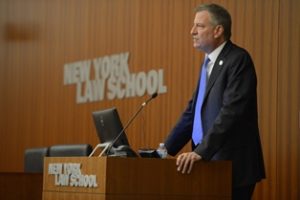
Mayor Bill de Blasio. Image credit: CityLand
Plan anticipates creating or preserving 20,000 homeownership opportunities by 2026. On December 11, 2017, Mayor Bill de Blasio announced two new programs, Open Door, which aids first-time homeowners buy a condo or coop, and HomeFix, which helps New Yorkers make capital improvements to their homes. These two programs will reach at least 2,100 households in eight years. These programs are part of the Mayor’s 300,000 affordable housing plan.
Open Door: A financing program that incentivizes the construction of coops and condos for moderate- and middle-income first-time homebuyers. The program will create approximately 200 affordable homes a year, and 1,300 by 2026.
HomeFix: A home repair program provides financing to low- and moderate-income homeowners by offering low-interest loans to fund needed repairs in one- to four-family properties. HomeFix will serve approximately 100 households a year, and 800 over the next 8 years. The program offers financial counseling.
Most of the nearly 10,000 homes financed since 2014 have had their affordability extended and rehabilitation financed, particularly in Mitchell-Lama coops. The City is redoubling its commitment to saving the remaining Mitchell-Lamas and other existing homeownership opportunities, and will seek to preserve another 8,000 homes over the extended 12-year plan.
The 2,100 goal builds on the nearly 10,000 homeownership projects financed by the City since 2014, many of them Mitchell-Lama cooperatives. The housing plan anticipates creating or preserving 20,000 homeownership opportunities by 2026. Owning a home helps families build assets that can help fund a college education and retirement. But for many, the dream of homeownership and home maintenance seems impossible.
Along with the Neighborhood Pillars program, the Mitchell-Lama Reinvestment Program, and Seniors First, Open Door and HomeFix are among a suite of new initiatives announced as part of the Mayor’s plan to accelerate the creation and preservation of affordable housing across New York City. The Mayor’s new plan, Housing New York 2.0, will finance 200,000 affordable homes by 2022 and 300,000 by 2026, enough to house the entire population of Boston.
“As we work to make this a fairer and better city, we want to help New York’s working families own a piece of their own city. Affordable homeownership empowers families and neighborhoods and opens pathways to the middle class,” said Mayor Bill de Blasio.
“Homeownership is a critical ladder to greater financial security for families, and a stabilizing anchor for neighborhoods. Through these new programs, more New Yorkers will have a shot at owning a piece of their city, and making the repairs they need to stay in their homes and communities,” said HPD Commissioner Maria Torres-Springer.
“The Mayor’s new initiatives, Open Door and HomeFix, will help thousands of moderate and low-income families take that first step towards owning and improving their own home,” U.S. Representative Gregory W. Meeks said.
“The cost of homeownership has become increasingly prohibitive for families who work hard and want desperately to raise children and set down roots in our city,” said Assembly Member Steven Cymbrowitz, Chair of the Assembly Housing Committee. “With these new programs, I’m pleased that so many families will at last have the opportunity they’ve longed for to fulfill the American Dream and keep our communities vibrant and strong.”
“Hundreds of families a year will now be able to seize an opportunity never available to them before as new home construction increases; and those already in homes will be able to more easily maintain them by with this new financing program. The financial counseling offered here is also key, indicative of another tool we can and should use to help keep families in their homes,” said Council Member Jumaane D. Williams, Chair of the Council’s Committee on Housing and Buildings.
“To really bridge the widening income inequality gap and provide a pathway to the middle class, we must promote affordable homeownership as one of the fastest ways to pass wealth from one generation to the next,” said Council Member Margaret S. Chin.

